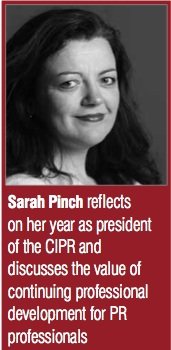
THE ONGOING PROFESSIONALISATION OF PR
“For any aspiring or current chartered professional, it is still just the start of the journey towards the most senior levels of management”
 The nights are drawing in and I am coming towards the end of my year as president of the Chartered Institute of Public Relations. I have been reviewing what I set out for the institute to achieve in 2015. I am particularly proud of the hard work of our board, council, staff and volunteers to make membership of the institute increasingly understood in terms of professional standards and ethical competence.
The nights are drawing in and I am coming towards the end of my year as president of the Chartered Institute of Public Relations. I have been reviewing what I set out for the institute to achieve in 2015. I am particularly proud of the hard work of our board, council, staff and volunteers to make membership of the institute increasingly understood in terms of professional standards and ethical competence.
A crucial measure of this has been how members – both old and new – have taken a step forward by committing to Continuing Professional Development (CPD). Through targeted campaigns over the summer months, we saw a far greater amount of members participating in professional development activities, and with the 29 February 2016 deadline looming, we’re in a stronger position in terms of individuals signed up and completing their CPD records than was the case 12 months ago. One of the key indicators of our progression has been to develop chartered status, so members understand the purpose and value of being a chartered practitioner as part of a clearly articulated pathway.
Last month the CIPR announced a new system for Chartered Public Relations Practitioner status. Any member who has completed three consecutive years of CPD will be eligible to attend a rigorous Chartered Practitioner Day, and become chartered on its successful completion. Chartered status is our biggest and best opportunity to express to our clients, employers and the wider world that they can and should expect the highest quality and standards from public relations professionals, in terms that are already understand.
For any aspiring or current chartered professional, it is still just the start of the journey towards the most senior levels of management. Gaining this status is no silver bullet; there is no one-size-fits-all ticket to the boardroom. And in our profession, there shouldn’t be. I am proud to work in an ever- evolving discipline and I believe it is only through maintenance of our professional skills and knowledge that we will continue to earn our stripes.
I recently spoke at Edge Hill University as part of the 10th anniversary of its PR diploma; we commented on how much the communications industry and technology have changed in that time. It was clear that anyone who stood still in 2005 is still standing. We must update our skills, learn a new thing every day and embrace the move from traditional media relations to influencing and directing all touchpoints of communication and interaction both inside and outside of the organisation.
The only way to stay relevant is by validating and accrediting a broad range of activities that develops and broadens your skills base so you can continue to add value to your clients and employers in innovative ways.
When I look at the boards I serve on, my board colleagues from other professional disciplines all have one unifying feature: evidence of active participation in skills, knowledge, insight development and verification from their own professional bodies that they are at the forefront of their respective discipline. That external validation has been a significant contributory factor in their success at board level – and they see their professional pride as an integral part of their success, not an add on. This is truly where I believe opening up chartered status will take us.
For the best part of half a century, the business world has called upon our passion and ability to help navigate through complex communications challenges with our words and opinions, but the time for talking a good game has come an end, it’s time for you to walk it.
Sarah Pinch is president of the CIPR



